WHY IT MATTERS TO YOU
Setting up solar panels can be a pain, but LG is creating simpler, more efficient modules to make it easier for residential use.
As concerns for the environment continue to rise, more and more people are switching over to greener forms of energy. One of the more famous options, solar energy, continues to upgrade beyond the giant panels of the past. With two new additions to its Neon solar panel line, LG is continuing the trend of slimmer, more efficient panels.
Many solar panels have two big weaknesses. During a cloudy day or other low-light scenarios, typical panels struggle to produce much energy. Conversely, if the weather is hot and sunny, the increased temperature of the panel can affect energy production. By keeping all the electrodes on the rear side, the LG Neon R allows 100 percent of the cell area to be used for energy generation. Additionally, the design improves temperature performance.
This 60-cell solar panel is rated at 365 Watts per panel. Compared to the 290W rating of other panels, the LG Neon R produces 26 percent more power. Despite the extra power generated, the life of the module should be longer. Most conventional panels use P-type cells coated in boron. This creates a semiconductor junction that induces current flow, but light induced degradation reduces its effectiveness over time. The N-type cells used in the Neon R are coated in phosphorus. This greatly reduces the degradation, maintaining maximum power output for longer.
For those still nervous about installing solar panels for their home, LG’s Neon 2 Ace simplifies the installation process and cuts set-up time in half. By integrating the micro inverter, owners simply have to connect a cable rather than installing it separately. Other improvements include enhanced output and temperature performance.
Throughout the industry, cells within solar panels are typically connected with three or more busbars. These allow the flow of electrons between cells. However, the LG Neon 2 Ace uses new cello technology and replaces the busbars with 30 thin wires. According to LG, this enhances output and reliability.
Whether it is simplicity or efficiency, LG’s Neon solar panels are built to last. Going beyond the standard 10-year warranty, the LG Neon 2 Ace comes with a 12-year unit warranty and a 25-year warranty for the micro inverter. For those interested in the power of the LG Neon R, this product also comes with a 25-year warranty.
Not sure if the price of converting to solar is worth it? ModSun will help do the math.
Source:
https://www.digitaltrends.com/home/lg-neon-solar-panels/

